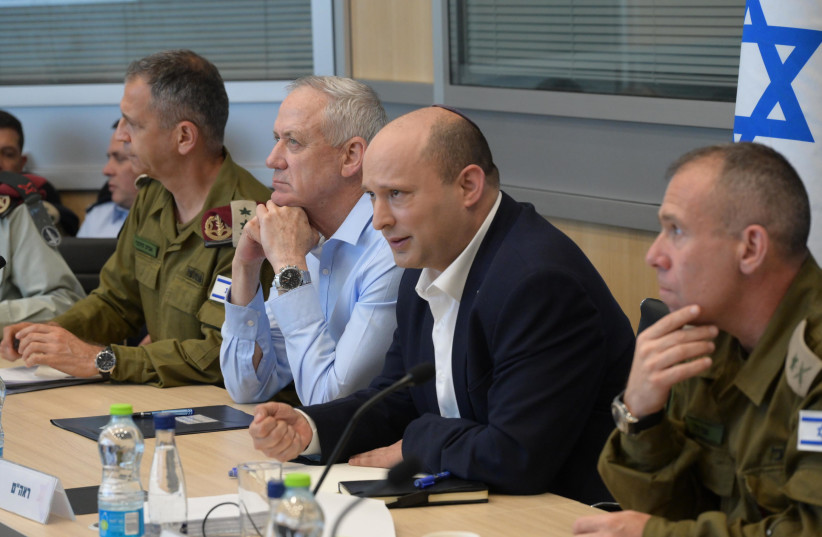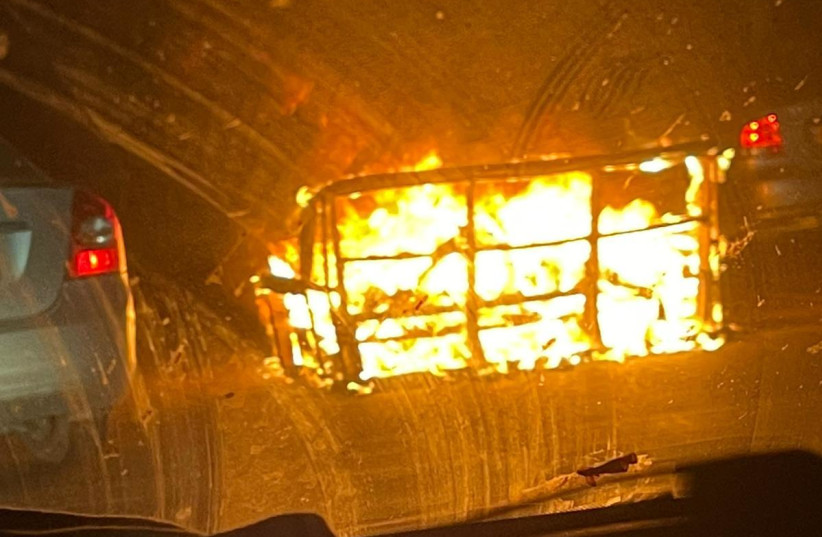The IDF is currently in the midst of its largest military drill ever: Chariots of Fire.
The drill is simulating a multi-front war, including hitting enemy targets far from Israel’s borders.
It is also readying for hostile action within Israel’s borders, preparing for twice the amount of Arab violence inside Israel than was seen last May during Operation Guardian of the Walls.
The drill is taking place on land, sea and in the air, with the US reportedly sending over refueling planes so the IAF can simulate a strike on Iran’s nuclear facilities.
It’s a big drill, and a big deal.

However, one Israeli city of some 60,000 residents sitting astride a strategic east-west road just north of the West Bank, Umm el-Fahm, has asked that IDF soldiers not enter its city limits to simulate fighting Hezbollah in Lebanon. Its request was granted.
The drill, Umm el-Fahm’s request, and that the request was granted provides a snapshot of the enormous challenges – external and internal – that Israel faces in the spring of 2022.
The existence of the drill itself - obviously meant to send a signal to the Iranians of Israel’s capabilities and determination - shows that the Iranian nuclear issue is not just one being discussed intermittently in Vienna and ad nauseam in the press. The threat is real, the threat has not gone away, and Israel is preparing for it quite seriously.

Is America’s expected participation just a ploy to get the Iranians to be more flexible in the talks in Vienna? Possibly. But it shows Iran, and the world, that Israel is once again planning for a possible attack on Iran's nuclear facilities in a way it has not done since the Joint Comprehensive Plan of Action was signed in 2015. That agreement effectively took an Israeli attack, and serious planning for such an attack, off the table, as Israel was not going to hit Iran after the US and the world’s leading powers reached a nuclear agreement with Tehran.
The second challenge the drill highlights is that in the event of future hostilities, the IDF will have to allocate resources to deal with violence and sabotage inside the country.
The IDF is preparing for double the amount of rioting seen last year during the 11-day war with Hamas – rioting that left two people dead, shattered the peace in Lod, Ramle, Haifa, Acre and Jaffe, and included Bedouin blocking a strategic road to the Nevatim Airbase in the Negev.
Lessons from those incidents were learned, and over the past year, the IDF has established a special unit whose job in wartime will not be to attack the enemy, but rather to keep Israeli Arabs from blocking roads and hindering the vital transfer of soldiers and weaponry from Point A to Point B. That is a new challenge, one that the country has previously never dealt with.
And the third challenge highlighted by the drill came in the form of a letter to Defense Minister Benny Gantz from Umm el-Fahm Mayor Samir Sobhi Mahamed.
“It is unnecessary to point out that armored personnel carriers moving in the city simulating conquering Hezbollah dramatically hurts the feelings of the residents of the city and its surroundings,” Mahamed wrote.
Furthermore, he continued, the significant time and effort he has spent in improving the city’s image, its quality of life and promoting coexistence will be harmed by the drill.
How?
“There is a good chance that an 18-year-old soldier or a hi-tech entrepreneur who takes part in the exercise to ‘conquer the enemy’ will have difficulty changing his view that Umm el-Fahm is the enemy even after the drill, and all our efforts to bring about the growth of a thriving hi-tech industry that will bring economic growth and an improvement of Umm el-Fahm’s image will go by the wayside,” he wrote.
The IDF acceded to his request, and will not use Um el-Fahm’s streets and alleys to train, as it uses the streets and alleys of so many other locales in the country: Druze villages in the Galilee to simulate Shia villages in Southern Lebanon, Ashkelon to simulate fighting inside Gaza, and Mahaneh Yehuda in Jerusalem and the Carmel Market in Tel Aviv to train soldiers on how to navigate in the casbahs of Nablus and Jenin.
While this decision shows sensitivity to the residents of Um el-Fahm, and there may be wisdom in doing so, both the request itself and granting it illustrate the terrible complexity currently facing the country.
On the one hand, the IDF announced that in the next confrontation it is preparing for double the scale of violence from Israeli Arabs than it faced the last time around. As a result, it is preparing to deal with that eventuality.
On the other hand, it is giving in to the request of one of those likely to participate in, or help foment, that violence. Not the Umm el-Fahm mayor himself or the vast majority of the city’s residents, but some of them – such as Islamic Movement Northern Branch head Raed Salah, who lives there, and whose movement, according to the IDF, is behind about 25% of the inciting material on social media that is fueling the current terror wave.
Salah’s sensibilities will be offended by IDF troops training in the hills of his city. Not only his sensitivities, of course, but also the sensibilities of other less radicalized citizens in the town. So the IDF decided to scupper the drill.
While the decision is very understandable, it also reinforces one of the biggest internal problems currently facing the country: a lack of governance over large swaths of the country.
There are pockets in Israel that seem extraterritorial, where the instruments of the state – be they the police, the army, the tax authorities, or Health Ministry supervisors – fear to tread. Sometimes because they are afraid for their physical well-being, other times because they don’t want to offend sensibilities.
It is admirable for a state to take into consideration the feelings and sensitivities of its citizens, but the citizens must also understand that the state also has responsibilities to carry out that may at times upset their sensibilities.
A Yediot Aharonot article on Tuesday reporting on the IDF’s decision not to train in Umm el-Fahm said the decision was met with opposition by some senior and mid-tier officers involved in the drill, who felt the IDF should not have “folded.” The army, they were quoted as saying, needed to “preserve governance” in the Wadi Ara area.
Wadi Ara is a region where the army is preparing to send in troops to keep key arteries open during the next war. As a result, the country needs to continuously assert its authority there, not forfeit it.
This whole saga could have been avoided with some forethought. The agreement reached after the mayor sent his letter was that the army would not train in Umm el-Fahm as part of the military exercise, but rather in the area around it.
Too bad that was not the original plan. Had that been the case, then the whole story – which shows the problem the state has in extending its governance to all parts of the country – would never have come to light. And the problem of governance is definitely not one Israel has an interest to highlight for all to see, lest exposure of the problem leads to its growth.
